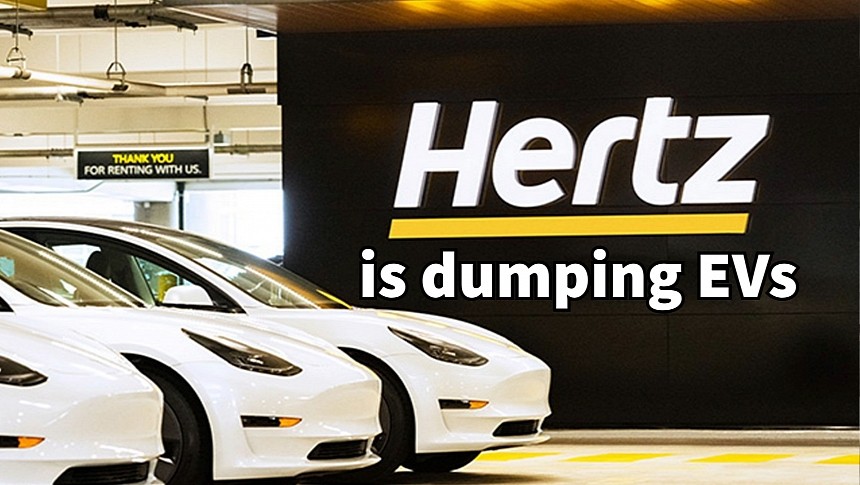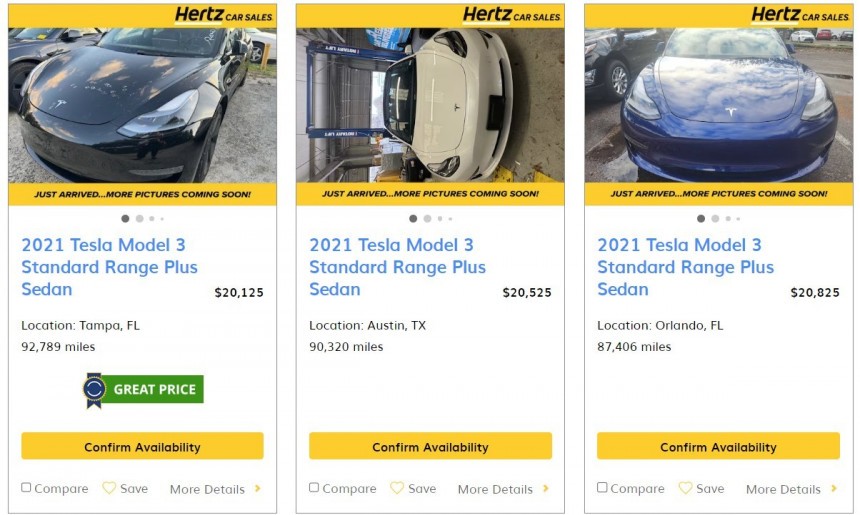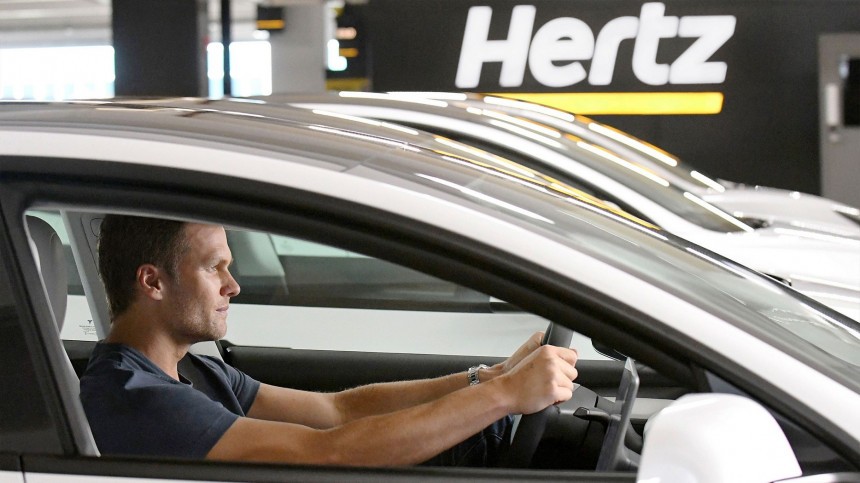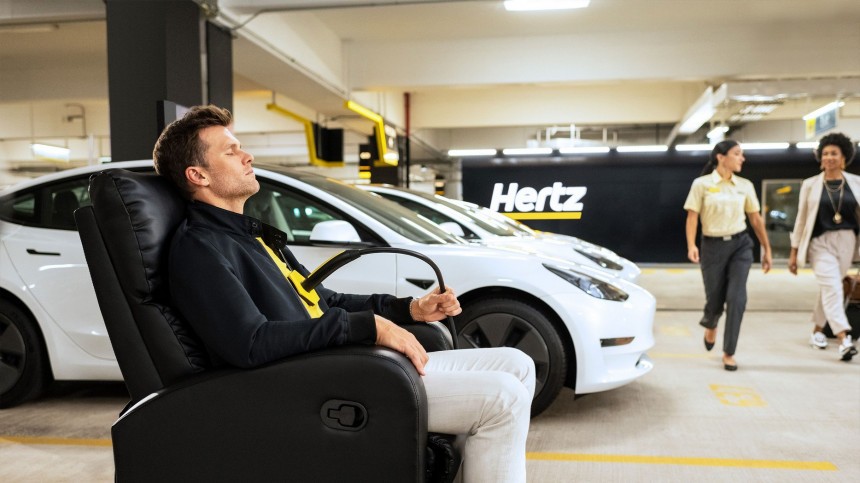Just as surprisingly as it started, Hertz's drive to go electric has ended. The car rental company announced that it's selling about a third of its EV fleet and reinvesting in gas-powered cars. Hertz cites weak demand for electric vehicles, as well as high operating costs for its EV fleet compared to ICE vehicles.
On Wednesday, we found out that Hertz is selling many of the Tesla Model 3 and Model Y in its fleet at bargain prices. The move was just as surprising as the announcement it made in 2021 about buying 100,000 Teslas. Since then, Hertz announced more EV deals with Polestar and GM. So far, you can only rent Tesla Model 3, Tesla Model Y, and Polestar 2 in the US, but the company also signed a deal with GM in 2022 to buy 175,000 EVs over five years.
Despite these massive deals, Hertz only had about 62,000 electric cars in its fleet at the end of September 2023. Roughly 80 percent of them (50,000 units) were Tesla Model 3s and Model Ys, and previous reports indicated that they were not exactly the public's favorites. Perhaps that's why, as far back as last April, it became clear that Hertz would not increase its EV fleet. At that time, 48,000 EVs were in its fleet, not much more than a few quarters back. Since Hertz increased its vehicle fleet during that time, it means that it actually bought more ICE vehicles instead of sticking to the initial electrification plans.
Even as Hertz's cold feet toward electric cars were becoming evident to outside observers, the company's management swore that customers were dying to drive a rented Tesla. This was something that few people believed, though. At the time, many Hertz customers reported that the airport parking lots were filled with rental Teslas that nobody wanted, despite Hertz offering their lowest rates on them.
Renting a Tesla was one of the best ways to see if an electric vehicle is what you need without committing to buying one. However, few wanted to rent the EVs in Hertz's fleet, and this is not entirely Tesla's fault. Driving an electric car for the first time could be intimidating, but it's also true that Hertz made no effort to make the experience less miserable. Many horror stories show how little Hertz cared for its customers' satisfaction.
One of the most outrageous stories involved two women, mother and daughter, who remained trapped inside the rented Tesla after it ran out of battery. Not knowing how to access the manual door release in the car, they could only get out of the vehicle through the boot after being instructed by a tow truck driver to use the tailgate release. It's safe to assume that countless Hertz customers had a bad experience renting a Tesla, and that contributed to the bad rap affecting EVs.
That's why I am not surprised that Hertz finally admitted that demand for its electric vehicles was not as high as it previously stated. Alienating your customers with a new type of vehicle without explaining to them the basics is a poor business decision and one sure to backfire. Now, Hertz is in a difficult position to sell many electric cars in its fleet and do it at a substantial loss, no less.
As I reported on Thursday, many Tesla Model 3s listed on the company's car sales page had prices below $20,000, with some early deals listed at $17,700. Luckily, Hertz bought many of those cars at a time when prices were not much higher than today. The Model 3 SR+ cost between $36,990 in February 2021 and $44,990 in November of that year. It reached the maximum of $46,990 in March 2022 and remained at this level until the massive price cut of January 11, 2023.
Had Hertz sold the cars before that happened, it could've pocketed a nice profit. However, the price cuts came totally unexpected and wiped a lot of value off Hertz's EV fleet. This is something the company complained about in the Q3 2023 earnings call. Now, as another quarterly result is about to be published, Hertz is poised to announce that its electrification plans did not pan out. According to a regulatory filing, Hertz is selling about a third of its EV fleet and buying gas-powered cars instead.
By replacing some of the EVs in its fleet with combustion vehicles, Hertz expects to gradually improve its financials throughout 2024. However bad this might look for Tesla and electric vehicles in general, it's much worse for Hertz. The company has made disastrous strategic decisions and is now paying the price. For starters, Hertz overestimated its EV needs and failed to consider what its customers wanted. Hertz clearly had more electric cars than people wanted to rent, which led to poor utilization.
It then did a lousy job educating its customers or even explaining the basics at the car's pickup. Finally, when complaints started pouring in, Hertz focused on dodging the responsibility and blaming the customer instead of assuming its own mistakes. In the case of the two women locked inside the rented Tesla, Hertz wanted them to pay for charging despite never getting the chance to charge the car. It then banned them from renting a Hertz vehicle after they refused to pay. It only agreed to cover everything after the story exploded in the media.
What Hertz does is, of course, closely watched by other car rental companies. But I don't expect this to lead to fewer electric vehicles in their fleets. On the contrary, as more electric cars are sold and more aware people become of them, the demand for EV rentals will only increase. Companies may find it difficult to gauge the market right now, but the trend toward electrification is unavoidable.
Despite these massive deals, Hertz only had about 62,000 electric cars in its fleet at the end of September 2023. Roughly 80 percent of them (50,000 units) were Tesla Model 3s and Model Ys, and previous reports indicated that they were not exactly the public's favorites. Perhaps that's why, as far back as last April, it became clear that Hertz would not increase its EV fleet. At that time, 48,000 EVs were in its fleet, not much more than a few quarters back. Since Hertz increased its vehicle fleet during that time, it means that it actually bought more ICE vehicles instead of sticking to the initial electrification plans.
Even as Hertz's cold feet toward electric cars were becoming evident to outside observers, the company's management swore that customers were dying to drive a rented Tesla. This was something that few people believed, though. At the time, many Hertz customers reported that the airport parking lots were filled with rental Teslas that nobody wanted, despite Hertz offering their lowest rates on them.
Hertz customers recount horror moments renting an EV
In several cases, people who rented a Tesla were offered the SR+ variant instead of the Long Range, which left them unable to complete their planned journey. Most of them were not instructed about the quirks of electric vehicles, charging, and how range can be affected by cold and driving conditions. Some even got their rentals with an empty battery. This has led to poor experiences and, ultimately, to people avoiding EVs altogether.One of the most outrageous stories involved two women, mother and daughter, who remained trapped inside the rented Tesla after it ran out of battery. Not knowing how to access the manual door release in the car, they could only get out of the vehicle through the boot after being instructed by a tow truck driver to use the tailgate release. It's safe to assume that countless Hertz customers had a bad experience renting a Tesla, and that contributed to the bad rap affecting EVs.
That's why I am not surprised that Hertz finally admitted that demand for its electric vehicles was not as high as it previously stated. Alienating your customers with a new type of vehicle without explaining to them the basics is a poor business decision and one sure to backfire. Now, Hertz is in a difficult position to sell many electric cars in its fleet and do it at a substantial loss, no less.
Had Hertz sold the cars before that happened, it could've pocketed a nice profit. However, the price cuts came totally unexpected and wiped a lot of value off Hertz's EV fleet. This is something the company complained about in the Q3 2023 earnings call. Now, as another quarterly result is about to be published, Hertz is poised to announce that its electrification plans did not pan out. According to a regulatory filing, Hertz is selling about a third of its EV fleet and buying gas-powered cars instead.
Why is Hertz selling its EVs, and what does that mean for the company?
The big sellout includes about 20,000 Tesla and Polestar EVs in the US. The company said it would log a $245 million incremental net depreciation expense related to this sale. The official reasons for selling the cars are the weak demand for electric vehicles and the high operating costs associated with them. Hertz has been complaining especially about the higher costs of repairs and insurance for the EVs in its fleet compared to ICE vehicles.It then did a lousy job educating its customers or even explaining the basics at the car's pickup. Finally, when complaints started pouring in, Hertz focused on dodging the responsibility and blaming the customer instead of assuming its own mistakes. In the case of the two women locked inside the rented Tesla, Hertz wanted them to pay for charging despite never getting the chance to charge the car. It then banned them from renting a Hertz vehicle after they refused to pay. It only agreed to cover everything after the story exploded in the media.
What Hertz does is, of course, closely watched by other car rental companies. But I don't expect this to lead to fewer electric vehicles in their fleets. On the contrary, as more electric cars are sold and more aware people become of them, the demand for EV rentals will only increase. Companies may find it difficult to gauge the market right now, but the trend toward electrification is unavoidable.










